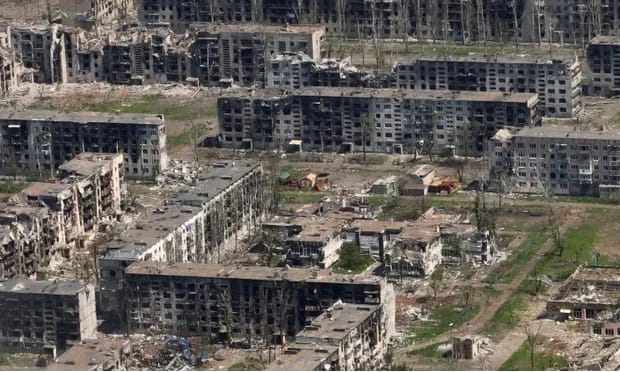German Marshall Fund says oligarchs biding their time until after war ends to reassert their influence
Patrick Wintour Diplomatic editor
Western powers will only protect Ukraine’s multibillion-dollar postwar recovery if they agree a unified strategy to make aid conditional on clear progress on combating judicial corruption, reinstating the obligation on Ukrainian public officials to declare assets and ensuring all recovery finds can be digitally traced, according to an authoritative report from the German Marshall Fund.
The US thinktank’s proposals, matching calls from Ukrainian civil society and G7 ambassadors in Ukraine, reflect a concern that donors have not yet assembled a strategy to ensure how recovery funds can be monitored in a country that has made progress in tackling capture by oligarchs since 2014 but still has many unreformed institutions.
The report, published before the UK government-led Ukraine recovery conference takes place in London, argues that Ukraine is fighting a two-front war to defeat Russia and to permanently embed the rule of law. Members of Ukrainian civil society feel they have been sidelined at the conference, which will be dominated by the private sector and international politicians.
“Ukrainian oligarchs are biding their time until after the war to reassert their influence,” says the report, partly written by former US officials involved in Ukrainian anti-corruption reform. “In the face of those realities, continuing to uproot oligarchy – a critical part of winning the war, rebuilding the country and preparing for EU accession – will require heavy domestic and foreign support. Beyond the executive branch, the parliament and the judiciary remain penetrated by powerful, unaccountable and obscure private interests.”
It says a new G7-established multi-agency donor platform “has not yet corralled donor countries – each with their own safeguarding procedures and anti-corruption reform initiatives for Ukraine – into agreement on policy reform priorities”.
The warning comes as the UK announced it was introducing laws to allow ministers to maintain sanctions on Russian assets until compensation is paid to Ukraine, so introducing a route for frozen Russian assets to be donated for Ukrainian reconstruction.
The laws go some way to ensuring that Russian assets currently frozen by the UK government can in effect eventually be seized, a move that many western powers have rejected on the basis that it could set a precedent for western assets held overseas to be seized by other countries. The UK stressed that the new laws did not amount to forfeiture and could only be imposed if there was evidence of criminal conduct.
The new laws will change the purpose of sanctions so that they will be maintained until Russia agrees to pay compensation, rather than merely protecting Ukraine’s territorial integrity, the current purpose of the sanctions. The UK is the first government to take these initial steps and accepts they may take time to resolve and require consultation.
New measures will also require a designated person to disclose all the assets they hold in the UK, with a failure to comply leading to a fine or a seizure.
It follows efforts by an all-party group of peers who have tabled an amendment to the economic crime and transparency bill currently in its report stage in the Lords, though ministers believe there are legal difficulties to the amendment and would prefer to table their own laws next year.
Further sets of measures will require individuals to disclose if they hold Russian sovereign assets in the UK and make it easier for Russians under sanction to have their assets voluntarily transferred and handed to Ukraine to help secure its recovery. Some Russian oligarchs have been signalling they would be prepared to give some money to Ukraine if their assets were released.
The foreign secretary, James Cleverly, said: “As Ukraine continues to defend itself against Russia’s invasion, the terrible impacts of Putin’s war are clear. Ukraine’s reconstruction needs are – and will be – immense. We will stand with Ukraine for as long as it takes to recover from Russia’s war of aggression and lay the groundwork for a prosperous nation.”
The chancellor, Jeremy Hunt, said: “Putin’s Russia must take financial responsibility for the wanton devastation it has wrought on Ukraine. These new measures – on top of our largest ever sanctions package – show the UK is ready and able to clear new paths to ensure Russian money reaches Ukrainian people.”
Officials said the measures were about establishing a framework for sanctioned Russian assets to be used for compensation.
Discussions are still under way about the transfer of the £2.3bn of proceeds from the sale of Chelsea football club to humanitarian causes in Ukraine and the long-term recovery, with the agreement of Chelsea’s former owner Roman Abramovich. Officials say Portugal needs to decide if a special licence is required since Abramovich is a Portuguese citizen.
The officials said they were reasonably optimistic that the negotiations would be completed soon.
